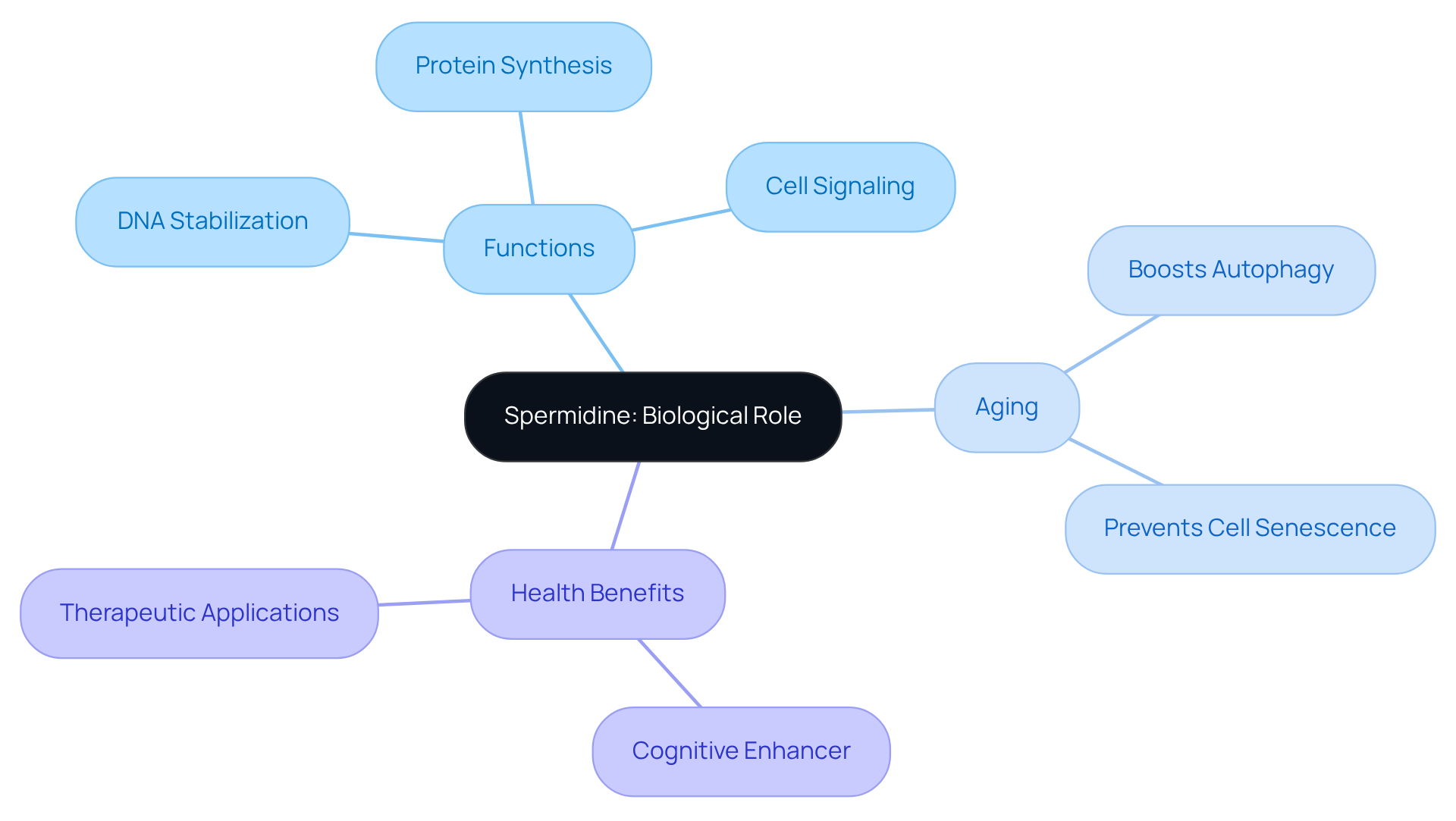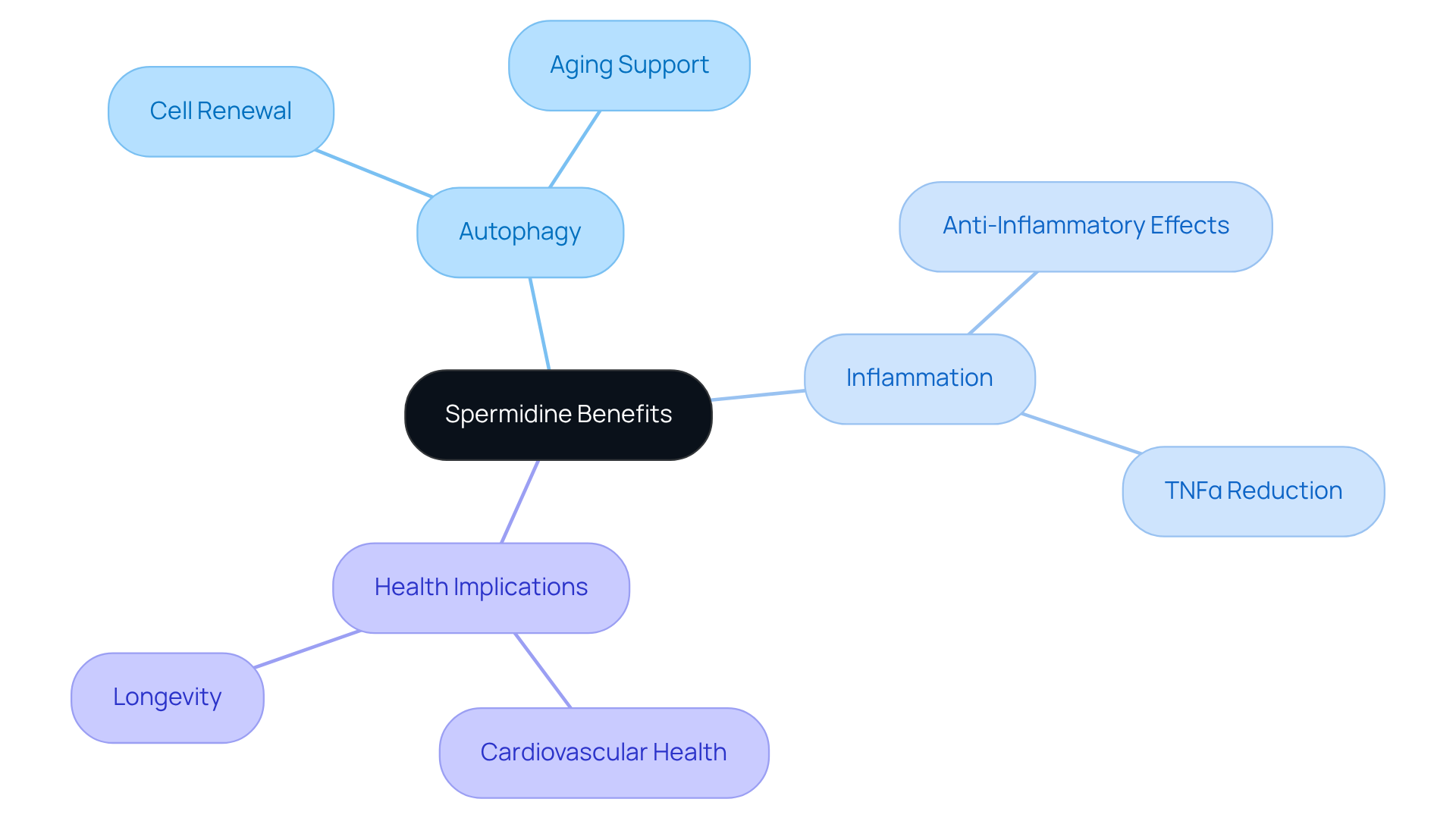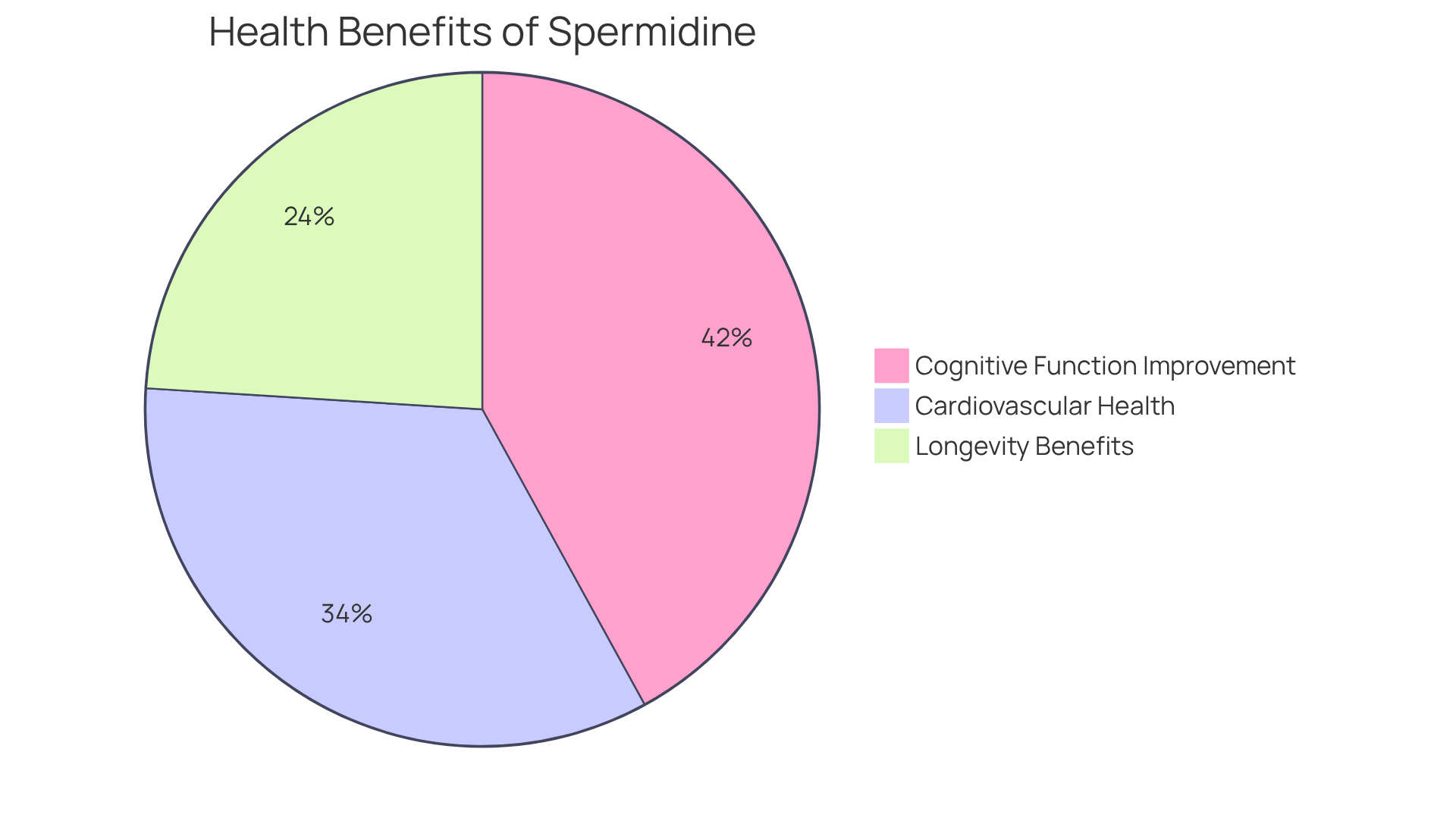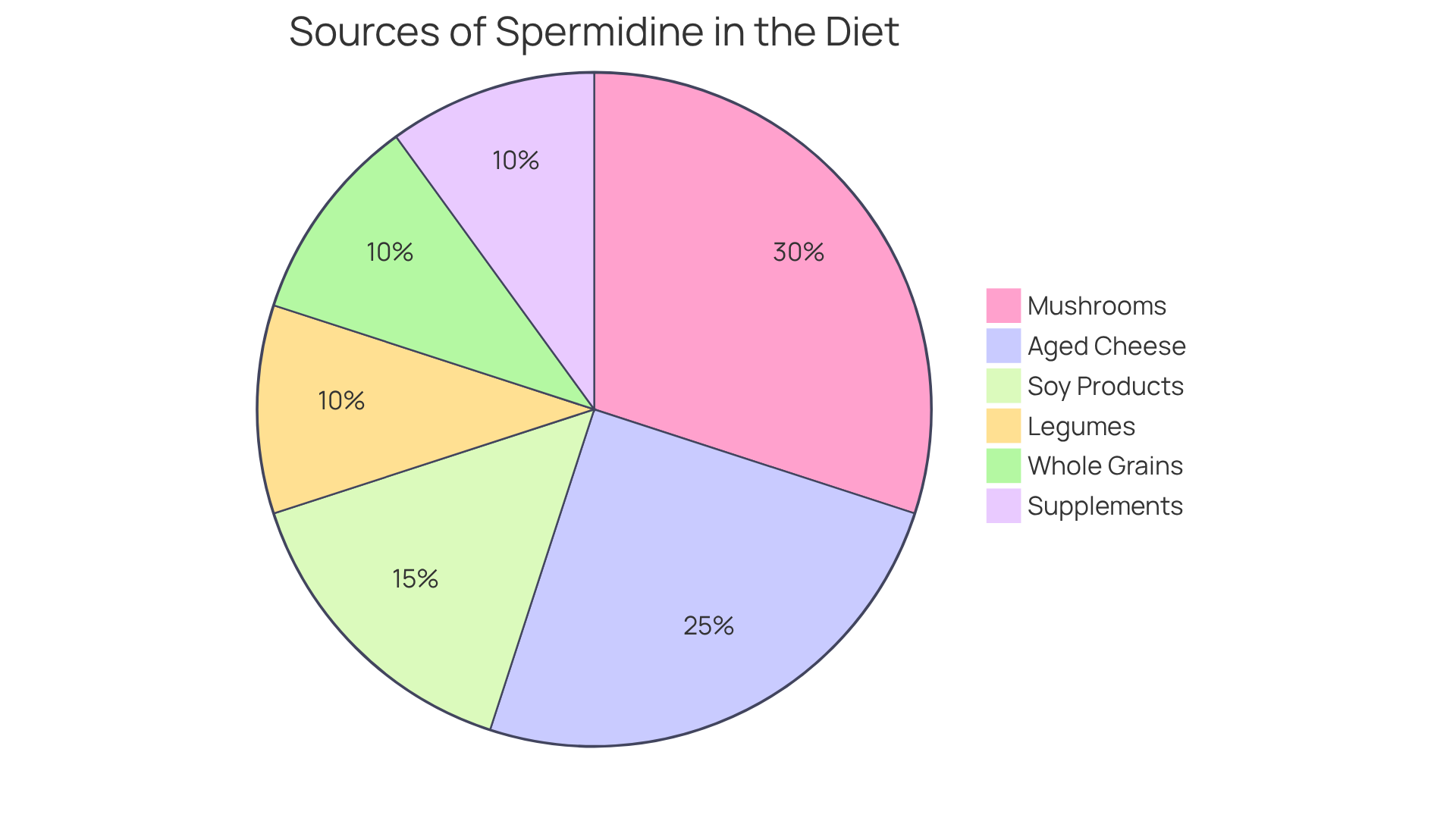Understanding the Benefits of Spermidine for Health and Longevity
Overview
Spermidine offers significant benefits for health and longevity. It promotes cellular autophagy, enhances cognitive function, and reduces the risk of age-related diseases. Research highlights a compelling connection between increased spermidine intake and lower mortality rates, as well as improved memory performance. This underscores its crucial role in maintaining health as we age.
Furthermore, understanding the implications of spermidine can empower individuals to make informed dietary choices. As a result, incorporating spermidine-rich foods into your diet may be a proactive step towards enhancing your overall well-being. Have you considered how such dietary changes could impact your health? Exploring further resources on spermidine can provide valuable insights into its potential benefits.
Introduction
Spermidine, a naturally occurring polyamine found in all living cells, plays a crucial role in various biological processes essential for growth and survival. As research uncovers its potential benefits, spermidine emerges as a key player in promoting health and longevity. This is particularly evident through its ability to enhance cellular functions like autophagy and reduce inflammation. However, with its levels declining as individuals age, a pertinent question arises: can increasing spermidine intake through diet or supplements truly unlock the secrets to healthier aging and improved cognitive function?
Define Spermidine: An Overview of Its Biological Role
Spermidine is a naturally occurring polyamine found in all living cells, playing a vital role in essential functions such as growth, differentiation, and survival. Synthesized from putrescine, this compound is essential to various biological processes, including:
- DNA stabilization
- Protein synthesis
- Signaling within cells
As a polyamine, it contributes significantly to homeostasis and is crucial for maintaining the integrity of structural components. Notably, levels of this compound decrease with age, prompting scientists to investigate the benefits of spermidine in enhancing both lifespan and health.
Research underscores the significance of the benefits of spermidine in cellular operations. For instance, studies have demonstrated the benefits of spermidine, as it can boost autophagy, a process essential for cell upkeep and longevity. This mechanism is particularly relevant as autophagy declines with age, leading to cellular dysfunction. Furthermore, the benefits of spermidine have been linked to enhanced memory performance in older adults, indicating its role as a cognitive enhancer.
As noted by researchers, the benefits of spermidine include its modulation of aging and suppression of the occurrence and severity of age-related diseases, highlighting its potential therapeutic applications. Additionally, case studies suggest that this supplement can prevent cell senescence, thereby enhancing the functions of aging immune cells. Together, these discoveries emphasize the benefits of spermidine, highlighting its essential role in biological processes and its importance concerning aging and longevity, especially when considered alongside other novel treatments and lifestyle changes that promote wellness and vitality.

Explore Mechanisms of Spermidine: Autophagy, Inflammation, and More
The benefits of spermidine are crucial as it plays a pivotal role in enhancing cell health primarily through the induction of autophagy, a process that eliminates damaged components and fosters renewal. This mechanism is particularly significant as organisms age, helping to maintain optimal cellular function. Additionally, spermidine exhibits significant anti-inflammatory characteristics, effectively diminishing chronic inflammation commonly associated with aging and several illnesses.
Studies suggest that increased dietary intake of certain compounds correlates with reduced levels of inflammatory markers. This indicates its potential in alleviating age-related inflammatory responses. For instance, research has demonstrated that this treatment can lower circulating tumor necrosis factor alpha (TNFα) levels, an important factor in inflammation, thus encouraging a healthier inflammatory profile.
The benefits of spermidine stem from its dual action of regulating autophagy and inflammation, positioning it as an essential nutrient for enhancing cellular function and lifespan. It is an intriguing focus for those seeking to improve their well-being as they age. Furthermore, investigating the neuroprotective mechanisms of Low-Dose Naltrexone (LDN) uncovers its potential in decreasing neuroinflammation, which is vital for preserving brain function as we grow older.
Grasping how LDN functions in the brain can deepen our understanding of its contribution to promoting overall well-being and vitality. What if incorporating these compounds into your diet could enhance your health as you age? Exploring these possibilities may lead to valuable insights for a healthier future.

Identify Health Benefits of Spermidine: From Longevity to Cognitive Function
Research indicates that the benefits of spermidine include numerous health advantages, particularly in promoting longevity, enhancing cognitive function, and supporting cardiovascular health. Epidemiological studies reveal a strong correlation between increased dietary intake of a specific polyamine and a notable reduction in mortality rates, especially concerning cardiovascular diseases and cancer. Notably, individuals with higher consumption of this compound exhibit a 24% lower mortality rate and a 47% decreased risk of developing Alzheimer’s disease.
Furthermore, supplementation has been linked to significant improvements in memory and cognitive abilities, with research demonstrating that 42% of participants experienced enhanced cognitive function after one year of daily intake. These findings suggest that this compound could serve as a valuable ally in combating age-related cognitive decline, highlighting the benefits of spermidine. The benefits of spermidine emphasize its diverse advantages and potential as an essential element in the quest for healthy aging.

Discover Sources of Spermidine: Foods and Supplements
Spermidine is abundant in a variety of foods, particularly those high in protein and certain plant-based sources. Notable examples include:
- Aged cheese, which is recognized for its high levels of this specific polyamine.
- Mushrooms, which can contain more than 120 mg of spermidine per kg.
- Soy products.
- Legumes.
- Whole grains, which are excellent sources, all contributing to a diet that supports healthy aging.
For individuals who may find it challenging to obtain adequate levels of spermidine through diet alone, supplements are available, providing a convenient alternative. Including these spermidine-rich foods in a balanced diet can help maintain optimal levels of this essential compound, which highlights the benefits of spermidine in potentially enhancing health and lifespan as one ages.
Studies suggest that the benefits of spermidine include higher levels associated with longevity, particularly due to its ability to promote cellular autophagy and support overall vitality. By prioritizing these dietary choices, individuals can take proactive steps toward healthier aging.

Conclusion
Spermidine emerges as a vital polyamine with profound implications for health and longevity. Its role in cellular processes—particularly in promoting autophagy and mitigating inflammation—underscores its potential as a key player in enhancing overall well-being as one ages. By understanding the multifaceted benefits of spermidine, individuals can appreciate its importance in the quest for healthier aging.
The article delves into the various mechanisms through which spermidine operates, such as its ability to stabilize DNA, support protein synthesis, and enhance cognitive function. It highlights compelling research linking increased dietary intake of spermidine to improved longevity and reduced risks of age-related diseases, including cardiovascular issues and cognitive decline. Furthermore, exploring dietary sources—from aged cheese to whole grains—provides practical insights for incorporating this beneficial compound into daily nutrition.
In light of these findings, embracing spermidine-rich foods or considering supplementation can be a proactive strategy for those aiming to enhance their health as they age. The evidence suggests that prioritizing spermidine not only supports cellular health but also fosters a more vibrant, longer life. Exploring the benefits of spermidine could pave the way for a healthier future, making it an essential focus for anyone committed to well-being and longevity.
Frequently Asked Questions
What is spermidine and where is it found?
Spermidine is a naturally occurring polyamine found in all living cells, playing a vital role in essential functions such as growth, differentiation, and survival.
How is spermidine synthesized?
Spermidine is synthesized from putrescine, which is a precursor compound in its formation.
What are the key biological processes that spermidine is involved in?
Spermidine is involved in DNA stabilization, protein synthesis, and signaling within cells.
How does spermidine contribute to homeostasis?
As a polyamine, spermidine significantly contributes to maintaining the integrity of structural components within cells.
What happens to spermidine levels as we age?
Levels of spermidine decrease with age, which has led scientists to investigate its potential benefits in enhancing lifespan and health.
What are the benefits of spermidine in cellular operations?
Spermidine is known to boost autophagy, a process essential for cell upkeep and longevity, which declines with age and can lead to cellular dysfunction.
How does spermidine affect cognitive performance in older adults?
Research indicates that spermidine has been linked to enhanced memory performance in older adults, suggesting its role as a cognitive enhancer.
What are the therapeutic applications of spermidine?
Spermidine has potential therapeutic applications in modulating aging and suppressing the occurrence and severity of age-related diseases.
Can spermidine prevent cell senescence?
Yes, case studies suggest that spermidine can prevent cell senescence, thereby enhancing the functions of aging immune cells.
Why is spermidine important in relation to aging and longevity?
Spermidine plays an essential role in biological processes related to aging and longevity, especially when considered alongside other treatments and lifestyle changes that promote wellness and vitality.






